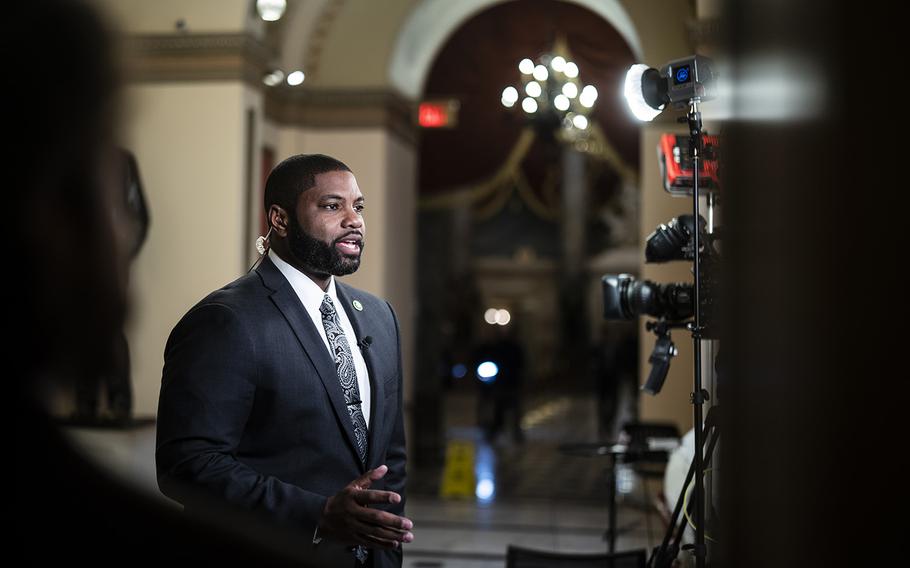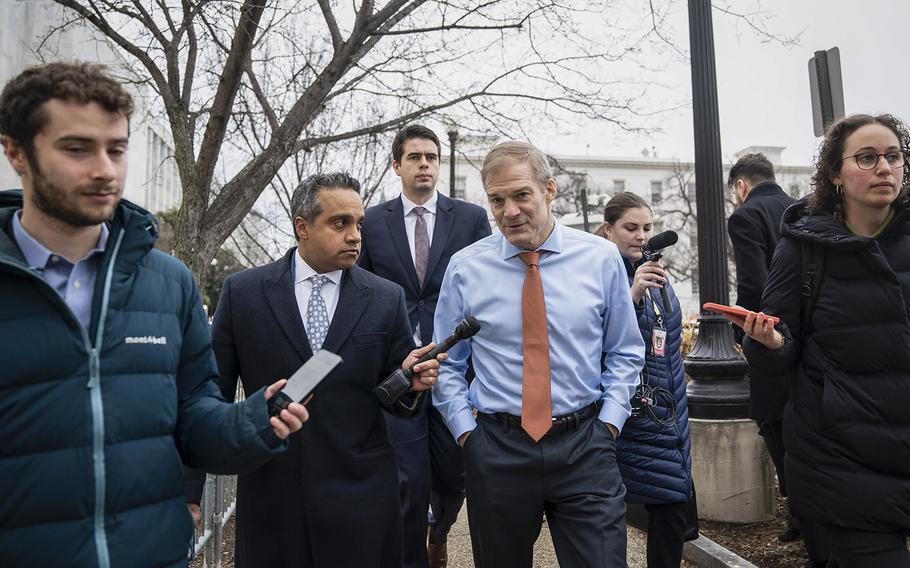
Rep. Byron Donalds, R-Fla., participates in a television interview on Capitol Hill on Jan. 9, 2023. (Jabin Botsford/Washington Post)
Awakening from a traditional media hibernation, House Republicans have begun to blitz the airwaves they previously shunned with brushoffs about the "lamestream media."
On any given day now, the new GOP majority posts a half-dozen or more members on CNN and MSNBC - two networks that increasingly became no-go zones for conservative lawmakers in the Trumpian era of "fake news" attacks. Republicans have appeared on streaming network news shows online and done interviews on those nightly news shows for cable.
Take last Sunday, when 2.5 million viewers of NBC's "Meet the Press" saw the first appearance in almost four years by the archconservative Rep. Jim Jordan, R-Ohio. Viewers to ABC's "This Week" and "Fox News Sunday" heard from a pair of prominent House Republicans, Reps. Michael Turner (Ohio) and Michael McCaul (Texas). And on CBS's "Face the Nation," House Speaker Kevin McCarthy, R-Calif., laid out his expectations for Wednesday's meeting with President Biden - making his first traditional Sunday appearance in almost two years, according to a Washington Post review of these talk show transcripts.

Rep. Jim Jordan, R-Ohio, speaks with reporters after leaving a House GOP conference meeting on Capitol Hill on Jan. 25, 2023. (Jabin Botsford/Washington Post )
Rep. James Comer, R-Ky., newly empowered as the chairman of the House Oversight and Accountability Committee, has his pick of prime opportunities every day, particularly on Sundays.
"I get asked every week - I've been asked to be on three [Sunday shows] this week," he said during an interview Wednesday just off the House floor.
By late in the week, Comer wanted to be home in Kentucky and could not pull together the logistics of a network satellite truck, so he won't be appearing. But several others will be spread across the network shows.
A new congressional majority usually attracts more media fascination, just as it did four years ago when Rep. Nancy Pelosi, D-Calif., returned as House speaker and young liberals, including Rep. Alexandria Ocasio-Cortez, D-N.Y., drew attention.
But this pivot for House Republicans comes after a prolonged standoff with the more traditional media outlets that came under attack during, and after, Donald Trump's grievance-driven presidency.
Following his lead, some Republicans shunned those outlets under the allegation that they were biased, part of an emerging view by far-right consultants who advise candidates essentially to shun all media except friendly outlets. Many Republicans, including some who are comfortable engaging with nonconservative outlets, shied away from these interviews because so much of the news cycle was driven by Trump scandals or the House's Jan. 6 committee - issues that they wanted to avoid.
Some Republicans, however, think they were the ones being shunned by mainstream outlets because of their votes against certifying President Biden's election after the Jan. 6, 2021, attack on the U.S. Capitol.
Conservatives didn't appear "because nobody asked them," said Comer, who voted to certify the election.
TV executives reject the accusation that some ban was in effect for the two-thirds of House Republicans who voted against certifying Biden's win, an idea that spread after CNN's Jake Tapper, NBC's Chuck Todd and others publicly debated in 2021 how to handle on their shows those who supported Trump's stolen-election claims.
This discussion by news hosts, while not an actual policy, gave some Republicans just the excuse they needed to shut the door on that segment of the media.
The impact became clear: House Republican voices, aside from the anti-Trump contingent, almost vanished from mainstream shows.
Sunday shows, which maintain detailed transcripts and guest listings, are the easiest barometer of the phenomenon. Of the five major shows - those on ABC, NBC, CBS and Fox, plus CNN's "State of the Union" - House Republicans combined for more than 105 appearances in 2021 and 2022.
But more than 45 of those appearances involved just two representatives: Liz Cheney, R-Wyo. and Adam Kinzinger, R-Ill.. Both now retired from Congress, they voted to impeach Trump, served on the Jan. 6 committee, and regularly expressed strong views against the former president in every TV appearance.
Separately, a combined dozen appearances were made by four other Republicans who voted to impeach Trump.
The remainder of the GOP caucus, more than 200 members, made about 50 appearances on the five shows over the two-year span. Almost a third of the appearances were by McCaul, now the House Foreign Affairs Committee chair, who regularly appeared to discuss hotbed moments in Afghanistan and Ukraine.
In January, now in the majority, House Republicans made 24 appearances on the five Sunday shows, a blistering pace to deliver their message to the total of more than 10 million viewers of those shows.
McCarthy has embodied this shift in strategy.
Aside from a combative interview about the Capitol attack on "Fox News Sunday" in spring 2021, he did not appear on any of the four other Sunday-morning shows during the previous two years. Instead, he regularly appeared on "Sunday Morning Futures With Maria Bartiromo" on Fox News, a show that Trump watches and which has a host known for conservative-friendly questions.
Yet during the marathon votes to claim the speaker's gavel last month, McCarthy opened up to traditional media, making impromptu appearances on CNN and MSNBC while walking to the House floor. When he finally won, he held a news conference after 2 a.m. in Statuary Hall, his newly preferred venue instead of the formal studio in the Capitol Visitor Center.
This past week, he held forth with White House reporters for more than 12 minutes after meeting with Biden on Wednesday, returned to the Capitol and held an unplanned huddle with reporters that lasted almost 35 minutes, and on Thursday held a planned news conference that lasted more than 20 minutes.
He has held six news conferences in less than four weeks as speaker. Last year, from March till mid-December, he held just four formal news conferences in the Capitol, according to a Fox News tally.
Even the most conservative lawmakers believe this is the right approach.
"This country is healthiest when there is a robust press that is getting all of the people that are elected representatives a platform to be able to have competing ideas for the American people to understand. I think that's true for CNN and for Fox," Rep. Chip Roy, R-Texas, said Thursday.
Roy, a conservative who fought McCarthy's ascension until winning major concessions, broke his own rule of reserving Sundays for family time to appear with Tapper the day after the speaker vote concluded.
"I get along pretty well with Jake. I was happy to do it," he said.
But Republicans acknowledge that some Trump allies are angry.
"I have people that I bump into all the time, still in Trump world," Comer said, "and they're like: 'Why were you on Pam Brown's show Sunday night? Why? Why do you go on Chuck Todd's [NBC] show?'"
Brown, a CNN anchor, is from a prominent Kentucky family and has long known Comer. He trusts her and other reporters at the outlet.
"I think it's important to talk to any interested, credible, sincere media outlet about what I'm doing," Comer said.
None of this is to suggest that Republicans are abandoning conservative media - far from it. McCarthy's first TV interview as speaker went to Fox News's Sean Hannity. He sat for a podcast with Donald Trump Jr. And two weeks before his return to traditional Sunday show fanfare on CBS, McCarthy dropped once again into the friendly confines of Fox News's "Sunday Morning Futures."
Republicans privately consider this approach akin to football's "spread offense," where a quarterback has many different options to pass all across the field. And there's an acknowledgment that Trump's popularity has faded a bit and, in the majority, House Republicans can focus these interviews on their policy proposals or oversight investigations.
Those appearances still result in combative interviews, but on topics with which Republicans are more comfortable. No one can say how long this opening to traditional media will last, but Comer is the leading apostle for now.
He understands that his investigations, particularly into the financial interests of Hunter Biden, have been heavily covered in conservative outlets. His mission is to try to educate as many middle-of-the-road viewers as he can reach on these mainstream outlets to explain what he's investigating.
On Sunday mornings, he's open for business for any one of the news shows, until the weather turns warm.
"I can go on them until my boy starts playing baseball," Comer said.
It's a 180-degree difference from life in the minority. His lone Sunday show appearance in the previous two years came just after Republicans won the November midterms, when he was on the cusp of claiming his powerful committee gavel.
"The only time they'd call me is if they absolutely had to have a Republican and 200 people had turned them down," he said.